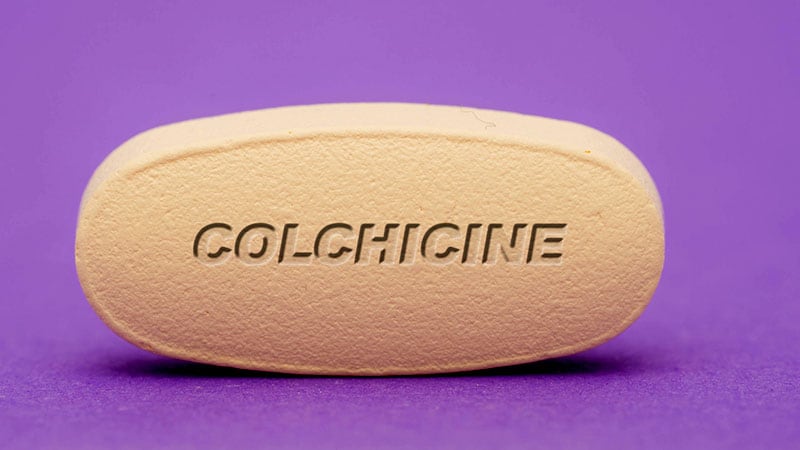Colchicine's Potential in Reducing Cardiovascular Risks: Emerging Evidence and Clinical Implications
Core Concepts
Colchicine, an anti-inflammatory drug, has shown promise in reducing the risk of major adverse cardiovascular events (MACE) in patients with established atherosclerotic disease or multiple cardiovascular risk factors.
Abstract
The article discusses the growing evidence supporting the use of colchicine in treating atherosclerotic cardiovascular disease (ASCVD). Key points:
Colchicine's mechanism of action: It dampens inflammatory markers on neutrophils, reducing their ability to adhere to inflamed or injured endothelium, which is a key contributor to plaque formation and rupture.
Clinical evidence:
The CANTOS trial showed that reducing high-sensitivity C-reactive protein (hsCRP) levels, a marker of inflammation, was associated with a lower risk of MI, stroke, or cardiovascular death.
The COPE-PCI Pilot trial demonstrated the benefit of targeting the interleukin pathways, which colchicine is known to affect.
Ongoing trials, such as POPCORN and CLEAR SYNERGY, are further investigating the role of colchicine in managing patients with acute coronary syndrome.
Preliminary data from a neutrophil biomarker substudy of CLEAR SYNERGY showed that colchicine reduced neutrophil adhesion to endothelial cells, neutrophil chemotaxis, and neutrophil activation, potentially inhibiting inflammasomes and decreasing IL-1β production.
Colchicine has been consistently shown to reduce the risk of recurrent myocardial infarction in patients with cardiovascular disease or at high risk, based on both retrospective and prospective studies.
Barriers to wider adoption: Confusion around the approved 0.5 mg dose for cardiovascular disease versus the 0.6 mg dose for gout, potential gastrointestinal side effects, and polypharmacy in these patients.
Evidence Builds to Support Colchicine in Treating ASCVD
Stats
Patients who received canakinumab and achieved hsCRP < 2 mg/L had a statistically significant 25% lower risk of MI, stroke, or cardiovascular death than those who received placebo.
Quotes
"Colchicine dampens inflammatory markers on neutrophils so that they are less likely to be attracted to inflamed or injured endothelium, which would be the site of where plaque is building up or where the plaque has ruptured in the setting of a heart attack."
"There are multiple studies, both retrospective studies in gout cohorts as well as prospective studies in the cardiovascular cohort, that all show consistently one thing, which is that colchicine continues to reduce the risk of having a recurrent MI in patients who either have cardiovascular disease or are at high risk of having cardiovascular disease."
Key Insights Distilled From
by Richard Mark... at www.medscape.com 05-06-2024
https://www.medscape.com/viewarticle/evidence-builds-support-colchicine-treating-atherosclerotic-2024a10008on
Deeper Inquiries
What are the potential long-term effects of using colchicine for cardiovascular risk reduction, and how do they compare to other anti-inflammatory therapies?
Colchicine, when used for cardiovascular risk reduction, has shown promising results in reducing the risk of major adverse cardiovascular events (MACE) in patients with atherosclerotic cardiovascular disease (ASCVD) or multiple risk factors for CVD. The long-term effects of colchicine in this context include a reduction in recurrent myocardial infarction (MI) and potentially lowering the risk of stroke or cardiovascular death. Compared to other anti-inflammatory therapies, colchicine's mechanism of action in dampening inflammatory markers on neutrophils and disrupting the IL-1ß–IL-6–hsCRP pathway has shown efficacy in reducing cardiovascular events. This sets colchicine apart as a potential option for long-term management of ASCVD.
How can the medical community address the barriers to wider adoption of colchicine for ASCVD prevention, such as the confusion around dosing and concerns about side effects?
To address the barriers to wider adoption of colchicine for ASCVD prevention, the medical community can focus on education and awareness campaigns targeting healthcare providers. Clear guidelines on the appropriate dosing of colchicine for cardiovascular risk reduction should be disseminated to ensure consistency in practice. Additionally, addressing concerns about potential side effects, such as gastrointestinal issues, through proactive monitoring and management strategies can help alleviate hesitations in prescribing colchicine. Collaborative efforts between cardiologists, rheumatologists, and other healthcare professionals can facilitate the integration of colchicine into treatment protocols for high-risk patients, ultimately improving patient outcomes.
Given the anti-inflammatory mechanisms of colchicine, are there any potential applications in the management of other cardiovascular or inflammatory conditions beyond ASCVD?
The anti-inflammatory mechanisms of colchicine, particularly its ability to dampen inflammatory markers and disrupt specific pathways involved in atherosclerosis, suggest potential applications in the management of other cardiovascular and inflammatory conditions beyond ASCVD. Colchicine's impact on neutrophil chemotaxis, activation, and inhibition of inflammasomes could be beneficial in conditions characterized by excessive inflammation, such as certain types of vasculitis or inflammatory arthritis. Exploring the use of colchicine in these contexts may offer new treatment options for patients with inflammatory cardiovascular diseases or systemic inflammatory conditions. Further research and clinical trials are warranted to investigate the broader therapeutic potential of colchicine in diverse disease states.
0
More on Cardiology
Cardiac Amyloidosis: A Potentially Underdiagnosed Cause of Heart Failure
Navigating the Evolving Landscape of Durable Mechanical Circulatory Support: Insights on Patient Selection, Outcomes, and Future Advancements
Updated Expert Consensus on Catheter and Surgical Ablation Strategies for Atrial Fibrillation
